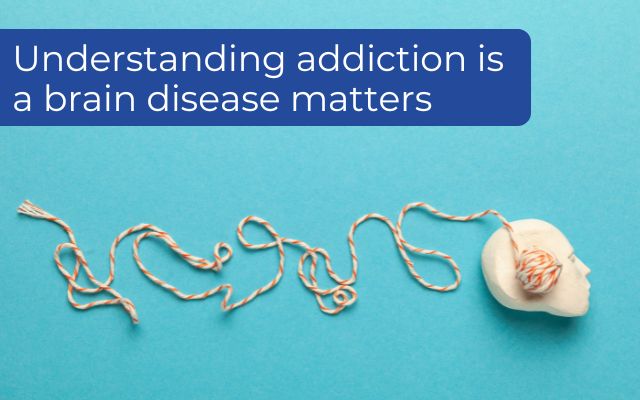Addiction was first described as a brain disease by scientist Alan Leshner in 1997. Twenty-five years later, scientific research and discovery show that the theory is still true and relevant today.
Understanding that addiction is a brain disease helps individuals understand they have a medical condition, helping them overcome much of the shame related to active addiction.
It does not, however, absolve individuals from taking responsibility for their problem, getting better through recovery and reaching out for help.
This understanding is also important for society at large because the more addicts access addiction treatment the less damage they cause to society through dangerous behaviours including criminal activities.
Addiction is a public health issue and not a moral issue. It is not a choice to be an addict, but you do have to choose to get well.

Addiction Is a Brain Disease Explained
Addicted individuals may have “distorted” thinking and behaviours, notes the American Psychiatric Association on its website. “Changes in the brain’s structure and function cause people to have intense cravings, changes in personality, abnormal movements, and other behaviours,” explains the Association. “Brain imaging studies [about people with addiction] show changes in the areas of the brain that relate to judgment, decision making, learning, memory, and behavioural control.”
Some people are more susceptible to developing an addiction than others due to a complex interplay between genetics, other medical conditions and environmental factors. According to Leshner, “estimates are that between 50% and 70% of the variability in susceptibility to becoming addicted can be accounted for by genetic factors”.
In this video our addiction psychiatrist explains more:
In people who are susceptible to addiction, repeated substance abuse affects the way the brain’s reward system functions. A helpful way to think of the effect of addiction on the brain is that drugs of abuse ‘hijack’ this reward system. The brain learns to associate drug use with pleasure. However, the body usually builds up a tolerance to the specific drug, leading to higher and more frequent drug use to achieve the same high.
Long-term drug abuse leads to structural changes in the brain. To compensate for the raised dopamine levels, the brain reduces the number of dopamine receptors. Research has found that a reduction in dopamine receptors is linked to a rise in impulsive behaviour including a rapid escalation of drug use.
The structural changes in the brain of those with an addiction persist long after a person stops using drugs or alcohol which cause cravings as well as put an individual at risk for relapse. Some changes are permanent, while others may not be. The exact nature of the permanence of these brain changes is still unknown.
According to the National Institute on Drug Abuse, some brain damage to the dopamine-based reward system appears to be, at least partly, reversible after some months of abstinence. Therefore, after prolonged abstinence, you can – at least in part – ‘rewire’ your brain.
Why It Matters
“The consequence [of becoming addicted] is virtually uncontrollable compulsive drug craving, seeking, and use that interferes with, if not destroys, an individual’s functioning in the family and in society. This medical condition demands formal treatment,” stated Leshner in his 1997 scientific paper.
“Addiction should be understood as a chronic recurring illness. Although some addicts do gain full control over their drug use after a single treatment episode, many have relapses. Repeated treatments become necessary to increase the intervals between and diminish the intensity of relapses until the individual achieves abstinence,” added Leshner.
Leshner noted that, just like other brain diseases such as schizophrenia and depression, addicted people need therapy.
“No matter how one develops an illness, once one has it, one is in the diseased state and needs treatment,” he said.
Acknowledging that addiction is a brain disease helps society recognise the importance of addiction treatment and facilitates wider access to such therapeutic intervention.
“We know that contrary to common belief, very few addicts actually do just stop on their own,” noted Leshner. “Observing that there are very few heroin addicts in their 50 or 60s, people frequently ask what happened to those who were heroin addicts 30 years ago, assuming that they must have quit on their own. However, longitudinal studies find that only a very small fraction actually quit on their own. The rest have either been successfully treated, are currently in maintenance treatment, or (for about half) are dead.”
This is one reason why medical aid schemes in South Africa cover at least 21 days of inpatient addiction treatment for their members per annum.
Seeing this problem as a brain disease is a crucial step in facilitating access to addiction treatment, without which addicts and alcoholics will likely cause more harm to themselves and society at large until they invariably die, go insane or get incarcerated.
Research shows addiction is a mental health issue that requires therapeutic intervention, much the same as other diseases of the brain.
It may come as a relief to many people who are stuck in the terrifying cycle of addiction that they have a medical condition and are not necessarily weak or bad people. However, this does not absolve individuals of the responsibility for taking action to get well.
READ MORE: Addiction is a brain disease: Explained
There is always help, hope, and help available. Changes Rehab Johannesburg is here to guide and support you through each step.
Call 081-444-7000 or email [email protected] to get the help you need today.
